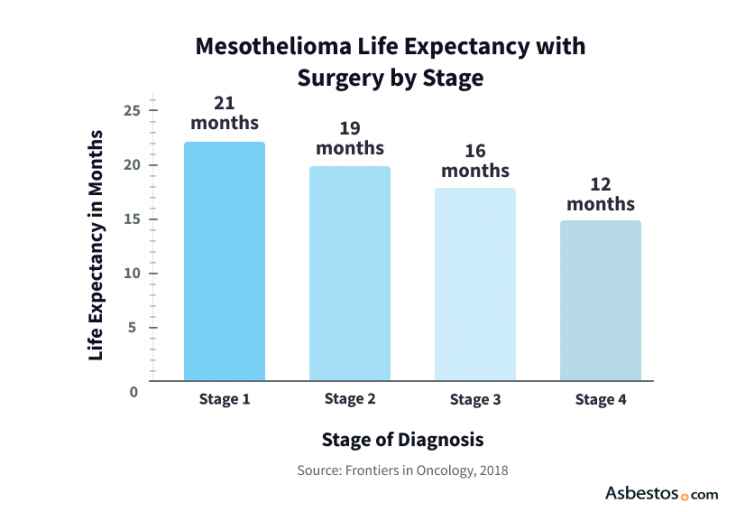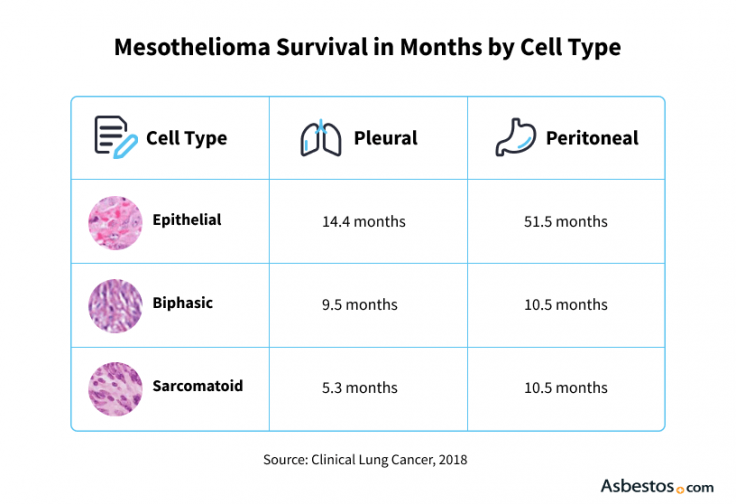米esothelioma Life Expectancy
米esothelioma survival rates average 12 to 21 months after diagnosis, even with treatment. Despite treatment, few patients have survived a decade after diagnosis. Factors affecting life expectancy include early detection, cancer type and stage. The current 5-year survival rate is approximately 10%.
Written byDr. Daniel A. Landau•Edited ByWalter Pacheco•米edically Reviewed ByDr. Jacques Fontaine
Asbestos.com is the nation’smost trustedmesothelioma resource
The Mesothelioma Center at Asbestos.com has provided patients and their loved ones the most updated and reliable information on mesothelioma and asbestos exposure since 2006.
Our team of Patient Advocates includes a medical doctor, a registered nurse, health services administrators, veterans, VA-accredited Claims Agents, an oncology patient navigator and hospice care expert. Their combined expertise means we help any mesothelioma patient or loved one through every step of their cancer journey.
米ore than 30 contributors, including mesothelioma doctors, survivors, health care professionals and other experts, have peer-reviewed our website and written unique research-driven articles to ensure you get the highest-quality medical and health information.
About The Mesothelioma Center at Asbestos.com
- Assisting mesothelioma patients and their loved ones since 2006.
- Helps more than 50% of mesothelioma patients diagnosed annually in the U.S.
- A+ rating from the Better Business Bureau.
- 5-star reviewed mesothelioma and support organization.
Testimonials
米y family has only the highest compliment for the assistance and support that we received from The Mesothelioma Center. This is a staff of compassionate and knowledgeable individuals who respect what your family is experiencing and who go the extra mile to make an unfortunate diagnosis less stressful. Information and assistance were provided by The Mesothelioma Center at no cost to our family.Lashawn米esothelioma patient’s daughter
How to Cite Asbestos.com’s Article
APA
Landau, D. A. (2023, October 2).米esothelioma Life Expectancy.Asbestos.com. Retrieved October 11, 2023, from //www.magnakarsa.com/mesothelioma/life-expectancy/
米LA
Landau, Daniel A. "Mesothelioma Life Expectancy."Asbestos.com, 2 Oct 2023, //www.magnakarsa.com/mesothelioma/life-expectancy/.
Chicago
Landau, Daniel A. "Mesothelioma Life Expectancy." Asbestos.com. Last modified October 2, 2023. //www.magnakarsa.com/mesothelioma/life-expectancy/.
What Is the Life Expectancy With Mesothelioma?
米esothelioma life expectancy ranges from 1 to 2 years with treatment. This refers to the expected survival time following diagnosis. Pleural mesothelioma patients undergoing aggressive therapy show a 5-yearsurvival rate的9.6%。如果不治疗,年代urvival beyond six months is rare.
“When we talk about the life expectancy for amesotheliomapatient or any cancer patient, we tend to talk about numbers,” Dr. Andrea Wolf of Mount Sinai Hospital told The Mesothelioma Center at Asbestos.com. “But people are people and an individual human being, not numbers and not data.”
Survivalstatisticsare general estimates, registered nurse and Patient AdvocateKaren Selbytold The Mesothelioma Center.
“When patients or their loved ones ask, I share that everyone is different and nobody can tell a new patient their life expectancy after just being diagnosed,” she said. “I explain that mesothelioma is no longer a death sentence.”
There are many ways you can improve yourmesothelioma prognosisand life expectancy. Understanding mesothelioma life expectancy is crucial because it will guide you and your loved ones through your cancer journey.

What Factors Affect a Mesothelioma Patient’s Life Expectancy?
Cancer type, age and health are critical factors in a patient’s life expectancy. Genetics, cell type, stage and gender also play a role. Managingcoexisting conditionsand improving overall health can help extend life expectancy. Survivor Jerry Lempe, for example, has lived more than 40 years since his peritoneal mesothelioma diagnosis.
“I say my prayer of thanks for the privilege of another day,” Lampe told The Mesothelioma Center. “It’s my way of not forgetting reality, but I often ask myself why I’m still alive.”
Initially told he had 6-12 months to live, Lampe found immunotherapy worked for him.
Tumor Location
Life expectancy can vary based on where tumors form in the body. Patients with peritoneal mesothelioma often live longer than patients with pleural tumors in the chest.
- People withpleural mesotheliomalive an average of three years with surgery.
- Peritoneal patients havemesothelioma in the abdomen.They have a life expectancy of about 12 months with chemotherapy.
- Pericardial mesotheliomaoccurs in the protective heart sac. These patients have an average life expectancy of 3-10 months.
- Life expectancy fortesticular mesotheliomais between 20 months and two years.
Roughly 3 in 4 pleural patients live longer than one year after amesothelioma diagnosis. About 50% of peritoneal mesothelioma patients live five years or more with aggressive treatments such as surgery.
Cancer Stage
Thestage of mesotheliomais a vital factor in your life expectancy. Doctors measure this from 1 to 4 to describe the extent of metastasis or tumor spread. Stage 4 is the most advanced and final phase. Life expectancy forstage 4 mesotheliomais 12 months with treatment.

Stages 1 and 2 are early stages. Patients with early-stage cancer tend to live for 19 to 21 months. Late-stage mesothelioma involves stages 3 and 4. These patients have a life expectancy of 12 to 16 months. If the cancer spread is not significant, you may be able to consider surgery.
Cell Type
Tumors include various types of cells. Life expectancy is higher for patients withepithelialtumor cells. Pleural patients with the epithelial cell type have a life expectancy of 14.4 months. Peritoneal tumors with epithelial cells increase life expectancy to 51.5 months. Sarcomatoid cells are more resistant to treatment.Biphasiccells are a mixture of the other two types.

Sarcomatoid mesotheliomatends to be more aggressive. These cells have a greater tendency to metastasize. Pleural patients with this cell type have a life expectancy of 5.3 months. Peritoneal tumors with sarcomatoid cells increase life expectancy to 10.5 months. Sarcomatoid patients often respond better to targeted therapies such as immunotherapy drugs.
Age
Younger people tend to have a longer mesothelioma life expectancy than older patients. They are often healthier and eligible for more treatments and clinical trials.
- Pleural mesothelioma patients at age 40 may expect to live between 4-9 years.
- At age 80, life expectancy is between 1-3 years.
The longer you survive with mesothelioma, the better your life expectancy becomes. A 45-year-old who has lived five years with pleural mesothelioma has a life expectancy of 11 to 16 years. At age 85, that life expectancy is 6-9 years.
Gender
米en traditionally have held more blue-collar jobs with a higher risk of asbestos exposure.
Survival Rates from American Journal of Surgical Pathology
- The 5-year survival rate for women with peritoneal mesothelioma is 77.8%.
- About 50% of men survive this cancer for five or more years.
- Women are nearly four times less likely to have mesothelioma than men.
Women withepithelial mesotheliomaalso live longer than men with the same cell type. An 80-year-old woman with pleural mesothelioma has a life expectancy of 2-3 years. Life expectancy for a man at age 80 with the same diagnosis is 1-2 years.
Overall Health
Chronic illnesses can decrease life expectancy. These can include heart disease, COPD, obesity and diabetes.
- Adopt a healthy diet
- Exercise regularly
- Stop smoking
The combination of smoking and asbestos exposure increases the risk of lung cancer. Together, they lead to shorter survival after a mesothelioma diagnosis. Of mesothelioma patients who smoke, about 20% live for one year. About 20% of nonsmoking mesothelioma patients live for at least two years.

How Does Treatment Affect Life Expectancy?
For most patients, treatment can extend life expectancy by several years. Stage 4 mesothelioma life expectancy is about one year withtreatment. Without treatment, the average is seven months. An early diagnosis allows for aggressive and specialized therapies. These options provide the most benefit.
“We’re doing lung-sparing surgery more and finding patients can tolerate additional treatments better. Patients are surviving longer with mesothelioma even if they recur or progress,”Dr. Andrea Wolftold The Mesothelioma Center.
- Chemotherapy.Chemois the primary treatment for mesothelioma. Pemetrexed (Alimta) and cisplatin chemotherapy improve life expectancy by more than 100% for some.
- Clinical Research.Clinical trialsuse newer drugs and procedures. Some use the immune system or genes in your DNA to treat cancer.
- Immunotherapy.Immunotherapy drugs use immune system cells to fight cancer. Checkpoint inhibitor drugs can improve life expectancy by about 30%.
- Radiation.Radiotherapyis a practical part of amultimodal treatmentplan. When combined with chemo it can improve life expectancy by about 40%.
- Surgery.Surgical procedurescan improve pleural mesothelioma life expectancy by more than 45%.HIPECsurgery in peritoneal patients may boost life expectancy by 37%.
- TTFields.The U.S. Food and Drug Administration approvedTumor Treating Fields for mesotheliomain 2020. This at-home treatment can extend life expectancy by almost 50%.
Palliative carecan help ease symptoms such as pain and other discomfort. Late-stage treatments include chemotherapy, radiation therapy and immunotherapy. Surgery is not a standard option due to higher risks.

Life Expectancy Without Treatment
With any diagnosis, cancer can progress fast without therapy. Pleuralmesothelioma life expectancy without treatmentis about 6-8 months. Peritoneal mesothelioma life expectancy without treatment is about six months.
Some patients feel uncomfortable with cancer treatment. Deciding if the benefits outweigh the risks of treatment is a personal decision. Consider discussing the benefits and risks with your loved ones or physician. Electing treatment is your best chance at living longer with cancer.
How Can I Improve My Life Expectancy?
You can improve your health and extend your lifespan by working with a specialist and maintaining fitness. You and your loved ones have access to many resources. Consult your doctor before starting any new diet, exercise or therapy. Some supplements can cause harmful effects with cancer drugs.
- Find a Mesothelioma Specialist.Thesedoctorsinclude oncologists, surgeons and others. They offer the latest and best therapies at top research andtreatment centers.
- Increase Activity Level.“Performance status” refers to activity level and general fitness. It affects life expectancy and the ability to recover from aggressive cancer treatments.
- Eat Right.Cancer patients need adequate nutrition to recover from treatments. A mesothelioma diet provides the protein and calories required to prevent weight loss. It also helps maintain immune function.
- Consider Integrative Medicine.Complementary or integrative medicine refers to nonmedical approaches combined with proven cancer treatment. Examples include acupuncture, meditation and yoga, which may reduce stress and pain.
A prognosis is a prediction of how well you might respond to treatment. This information can be very personal. Remember thatsupportis available. Amesothelioma diagnosisis challenging, but you don’t have tocope with the stressalone.
When a patient’s loved ones ask about life expectancy, I recommend oursupport groupandWall of Hope. Patients often note life expectancy when letting me know that they’re looking for an action plan as far as managinglegal action,VA benefitsand making sure they can be there to attend milestones like a family wedding.Patient Advocate
Common Questions About Mesothelioma Life Expectancy
- What is the longest someone has lived with mesothelioma?
-
Jerry Lampehas lived more than 40 years with peritoneal mesothelioma, longer than any known survivor. Some mesothelioma patients live more than 10 years after their diagnosis.Tamron Little, a contributing writer for The Mesothelioma Center, has survived 15 years with peritoneal mesothelioma.
Tim C. was diagnosed with pleural mesothelioma in 2002. He underwent an extrapleural pneumonectomy at Brigham and Women’s Hospital. He’s lived more than 20 years since then and attributes his success to the support of his family.
- Which type of mesothelioma has the longest life expectancy?
-
Peritoneal mesothelioma has the longest life expectancy. This is due to the effectiveness of the heated intraperitoneal chemotherapy procedure. A 2018 study reported that median disease-free survival withHIPECwas almost five years. The median overall survival was more than eight years.
- Does mesothelioma have the shortest life expectancy compared to other cancers?
-
是的。最短5年的癌症生存estimates are mesothelioma (7.2%), pancreatic cancer (7.3%) and brain cancer (12.8%). The highest 5-year survival estimates are seen in patients with testicular cancer (97%), skin melanoma (92.3%) and prostate cancer (88%).
- Will remission extend the life expectancy of a mesothelioma patient?
-
Remission does not necessarily increase mesothelioma life expectancy. A patient in remission has limited symptoms with no noticeable signs of cancer. Tumor cells may still be present and recurrence is possible. Mesothelioma can progress rapidly, but a long remission often indicates successful treatment.












